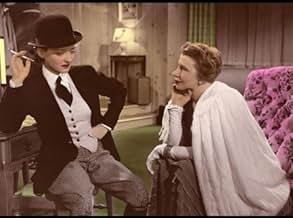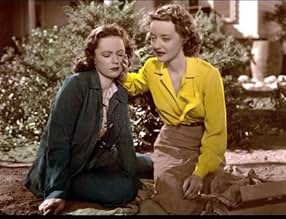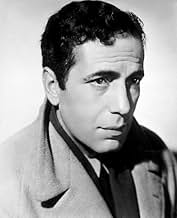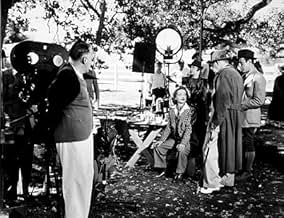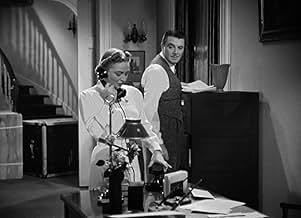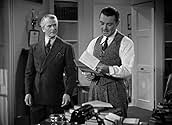IMDb रेटिंग
7.4/10
13 हज़ार
आपकी रेटिंग
अपनी भाषा में प्लॉट जोड़ेंA young socialite is diagnosed with an inoperable brain tumor, and must decide whether or not she'll meet her final days with dignity.A young socialite is diagnosed with an inoperable brain tumor, and must decide whether or not she'll meet her final days with dignity.A young socialite is diagnosed with an inoperable brain tumor, and must decide whether or not she'll meet her final days with dignity.
- निर्देशक
- लेखक
- स्टार
- 3 ऑस्कर के लिए नामांकित
- 5 जीत और कुल 4 नामांकन
Black Ace
- Judith's Horse
- (बिना क्रेडिट के)
Marian Alden
- Judith's Friend
- (बिना क्रेडिट के)
Wilda Bennett
- Judith's Friend
- (बिना क्रेडिट के)
Diane Bernard
- Lucy - a Servant
- (बिना क्रेडिट के)
फ़ीचर्ड समीक्षाएं
It's easy to see why Bette Davis admired "Dark Victory" more so than any of her other star-vehicles--her Judith Traherne is the quintessential Bette Davis character: smart, sassy, nervously gay, a drinking pal to the guys and a best buddy to the girls. Traherne is without malice, a real chum, and Davis plays her with fluttery vitriol and upper-crust glee. Long Island society girl, ailing but still strong, falls wildly in love with her doctor...but how can he tell her that she has very little time left to live? The supporting cast is made up of some odd personalities: Geraldine Fitzgerald's dedicated girlfriend seems to have no life outside of Judith's world (and performs her gal-pal duties with a curious severity); Humphrey Bogart is an Irish stable-hand with a secret crush on Judith (she's tempted, but ultimately conveys to him the old 'don't touch' message); Ronald Reagan is a country club type, always in a tuxedo and at the bar; George Brent is the brilliant surgeon who loves Judith (but he's faster with his fists than he is with words). Based on a play by George Emerson Brewer, Jr. and Bertram Bloch (which had starred Tallulah Bankhead), this chatty Warner Bros. weeper is glossy and flossy, a dithering, overstated, swooning romantic mini-epic for masochists. In other words, the archetypal Bette Davis film. *** from ****
This is definitely a tear-jerker involving a young socialite Judith Traherne, (Betty Davis) who is full of life and an only child who gets her own way all the time, but is well liked by everyone. Judith loves horses and enjoys riding them and performing with them in various horse shows. The trainer of these horses is Michael O'Leary, (Humphrey Bogart) who loves his work and likes Judith because of her love for animals. One day Judith is riding her horse and her vision becomes blurred and she sees double and falls off the horse. It seems Judy is having bad headaches but does not mention it to anyone and her own doctor refers her to a Dr. Frederick Steele, (George Brent) who is a brain surgeon. Ronald Reagan appears in this film as a playboy drunk who is always drinking. Great performance by all the actors, but bring the tissue box, you will need it.
There are three central performances in DARK VICTORY that deserve praise for their sincerity and complete believability--BETTE DAVIS as the spoiled heiress, GEORGE BRENT as the doctor who falls in love with her and GERALDINE FITZGERALD as the conscience of the story, feeling pity and love for her dearest friend.
Davis trounces around through the first half to show us what kind of energy and volatility is flaring beneath the surface--so full of life that when she realizes her illness bears the stamp of "prognosis negative", it's a shock to the audience as well as the actress. She's at her level best in all of the quieter moments--and never more impressive than in the final ten minutes of the film where her character must face the impending death with dignity and the knowledge that she has her husband's love and her best friend's devotion.
The scene in the garden with Fitzgerald at her side is the most luminous in the entire film. It's worth waiting for just to watch two great actresses at work.
Max Steiner's score is fitting at all times--even in the final moments when Bette goes up the stairs accompanied by his melancholy main theme. Edmund Goulding gets sensitive work from his entire cast--with the exception of Ronald Reagan who is given absolutely nothing in the way of character development except to look tipsy in every scene. To say that he is wasted is an understatement. So too is Henry Travers as the doctor who brought Davis into the world. Humphrey Bogart has been criticized for his Irish accent, but he's at least acceptable in a minor role as a horse trainer.
But the three central performances are what hold the film together--and make what is essentially a sob story work so beautifully.
Trivia: George Brent is very effective in the doctor role that was first offered to Basil Rathbone, but then withdrew after a very bad screen test in the part convinced the studio (and Rathbone) that he was all wrong for the role.
Davis trounces around through the first half to show us what kind of energy and volatility is flaring beneath the surface--so full of life that when she realizes her illness bears the stamp of "prognosis negative", it's a shock to the audience as well as the actress. She's at her level best in all of the quieter moments--and never more impressive than in the final ten minutes of the film where her character must face the impending death with dignity and the knowledge that she has her husband's love and her best friend's devotion.
The scene in the garden with Fitzgerald at her side is the most luminous in the entire film. It's worth waiting for just to watch two great actresses at work.
Max Steiner's score is fitting at all times--even in the final moments when Bette goes up the stairs accompanied by his melancholy main theme. Edmund Goulding gets sensitive work from his entire cast--with the exception of Ronald Reagan who is given absolutely nothing in the way of character development except to look tipsy in every scene. To say that he is wasted is an understatement. So too is Henry Travers as the doctor who brought Davis into the world. Humphrey Bogart has been criticized for his Irish accent, but he's at least acceptable in a minor role as a horse trainer.
But the three central performances are what hold the film together--and make what is essentially a sob story work so beautifully.
Trivia: George Brent is very effective in the doctor role that was first offered to Basil Rathbone, but then withdrew after a very bad screen test in the part convinced the studio (and Rathbone) that he was all wrong for the role.
Bette Davis always cited this as her favourite role: it is probably on a par with Margo Channing in ALL ABOUT EVE as the part which fans identify with as definitive Davis. Naturally, this 1939 film will look a little musty, corny and cliched to modern day viewers, but the poignant sincerity in which Davis instilled via her magnificent performance still has the ability to leave the viewer in helpless tears: you can be dumbfounded to think that something so obviously aimed at your tear ducts could succeed to induce the flow so completely and spontaneously! The role is based upon a 1934 play in which Tallulah Bankhead flopped. The character of Ann King was written especially for the film by director Edmund Goulding: as a kind of Greek Chorus so Judith wouldn't have to complain about the inevitable. Geraldine Fitzgerald, in her American film debut, does a wondrous job with the part of Ann: a beautifully etched supporting performance. As Michael O'Leary, Humphrey Bogart is unfortunately inept in the Irish brogue department (why couldn't they have simply cut out the accent?) and George Brent is adequately wooden as Dr. Frederick Steele whom Judy marries. Davis slams through a gooey collection of cliches in her nerviest style during the early segments but her metamorphasis into a vibrantly humbled married woman is quite a striking contrast to the selfishly brazen spoiled heiress: truly a multi-faceted performance. Ronald Reagan gets to play Alec, one of Judy's drunken swains, and Cora Witherspoon is memorable as the snotty Carrie. The last twenty minutes of the film are expertly crafted and timelessly tear-jerking: the movie sold more kleenex than any other of its day.
When Bette Davis was in ball buster mode, watch out!! But when she decided to suffer nobly, she could suffer with the best of them.
In "Dark Victory," Davis plays a woman dying from the deadliest of deadly diseases---the vague, unnamed illness that beautiful actresses died of in movies from the 1930s. The symptoms never seem to be the same, but they're always tear-inducing. Here, they make Davis go blind and we know when the disease is getting worse because a fuzzy black halo begins to appear around the edges of the frame.
Actually, this movie is a rather pale companion to the ultimate Davis melodrama, "Now, Voyager." But it has perhaps my favorite line ever delivered in a Bette Davis movie. She's found out that her illness is fatal, and she's at dinner with the doctor who has kept this from her to protect her fragile soul. When the waiter comes to take her order, she says, "How about a nice big helping of..." pause, as she throws the most withering of withering stares at her companion ..."prognosis negative." That should really be on a bumper sticker somewhere.
As for the other actors.....wait, other actors? No one watches a Bette Davis movie to see other actors. I'm not even sure there were any other actors in this movie.
Grade: B
In "Dark Victory," Davis plays a woman dying from the deadliest of deadly diseases---the vague, unnamed illness that beautiful actresses died of in movies from the 1930s. The symptoms never seem to be the same, but they're always tear-inducing. Here, they make Davis go blind and we know when the disease is getting worse because a fuzzy black halo begins to appear around the edges of the frame.
Actually, this movie is a rather pale companion to the ultimate Davis melodrama, "Now, Voyager." But it has perhaps my favorite line ever delivered in a Bette Davis movie. She's found out that her illness is fatal, and she's at dinner with the doctor who has kept this from her to protect her fragile soul. When the waiter comes to take her order, she says, "How about a nice big helping of..." pause, as she throws the most withering of withering stares at her companion ..."prognosis negative." That should really be on a bumper sticker somewhere.
As for the other actors.....wait, other actors? No one watches a Bette Davis movie to see other actors. I'm not even sure there were any other actors in this movie.
Grade: B
क्या आपको पता है
- ट्रिवियाOff-screen, Bette Davis suffered a nervous breakdown during filming as a result of her crumbling marriage to Harmon Nelson. Reportedly, producer Hal B. Wallis convinced Davis that she could benefit by using these real-life emotions of pain and loss to enhance the portrayal of her character. Meanwhile, Davis's marital problems didn't prevent her from embarking on an affair with co-star George Brent. Davis and Brent appeared in a total of 11 movies together.
- गूफ़When the setting changes to Vermont towards the end of the film, there is snow on the ground and it is obviously winter. Yet most of the trees in front of the house still have leaves on them.
- इसके अलावा अन्य वर्जनAlso available in computer-coloured version.
- कनेक्शनFeatured in Stars on Horseback (1943)
- साउंडट्रैकOH, GIVE ME TIME FOR TENDERNESS
(1939) (uncredited)
Music by Edmund Goulding
Lyrics by Elsie Janis
Sung by Vera Van
टॉप पसंद
रेटिंग देने के लिए साइन-इन करें और वैयक्तिकृत सुझावों के लिए वॉचलिस्ट करें
विवरण
बॉक्स ऑफ़िस
- दुनिया भर में सकल
- $345
- चलने की अवधि1 घंटा 44 मिनट
- रंग
- ध्वनि मिश्रण
- पक्ष अनुपात
- 1.37 : 1
इस पेज में योगदान दें
किसी बदलाव का सुझाव दें या अनुपलब्ध कॉन्टेंट जोड़ें



